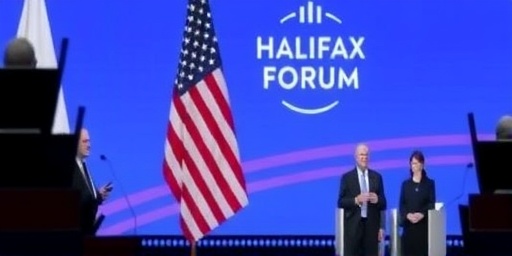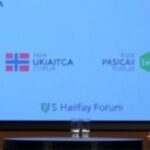In a fiery display of unity at the Halifax International Security Forum, a group of US senators from both sides of the aisle unleashed scathing criticism against President Donald Trump‘s latest Russia-Ukraine peace plan, labeling it a dangerous concession that would effectively reward Moscow’s unprovoked invasion. The bipartisan rebuke, delivered on the forum’s stage in Nova Scotia, Canada, highlighted deep concerns over the proposal’s exclusion of Ukraine from negotiations and its potential to erode American credibility on the global stage.
Senators Unite in Rare Bipartisan Fury Over Moscow’s Gains
The Halifax International Security Forum, a premier gathering of global security experts and policymakers, became the unlikely battleground for this sharp congressional takedown. Democratic Senator Jeanne Shaheen of New Hampshire set the tone, declaring, ‘This so-called peace plan isn’t peace—it’s capitulation. Rewarding aggression with territorial concessions would send a message to dictators worldwide that invasion pays off.’ Her words echoed sentiments from Republican Senator Lindsey Graham of South Carolina, who added, ‘I’ve stood with Ukraine from day one, and I won’t support any deal that lets Putin keep what he’s stolen through bloodshed.’
This rare alignment across party lines underscores the gravity of the issue. Since Russia’s full-scale invasion of Ukraine in February 2022, the US Senate has approved over $113 billion in aid to Kyiv, including military, humanitarian, and economic support. Bipartisan resolutions condemning the war have passed with overwhelming majorities, making the senators’ unified front at the forum a powerful signal. The event, attended by over 200 delegates from 40 countries, amplified their voices, drawing immediate media attention and sparking debates in Washington.
Forum organizers noted the session’s intensity, with moderator Heather Conley of the German Marshall Fund describing it as ‘a pivotal moment for transatlantic solidarity.’ The criticism wasn’t isolated; it built on months of growing unease in Congress about Trump‘s approach to the conflict. Earlier this year, a Senate Foreign Relations Committee hearing saw similar bipartisan pushback, where senators questioned the administration’s reluctance to impose tougher sanctions on Russian energy exports.
Inside Trump‘s Controversial Russia-Ukraine Peace Plan
At the heart of the senators’ outrage is Trump’s proposed Russia-Ukraine peace plan, which envisions a ceasefire along current front lines, potentially ceding Crimea and parts of Donbas to Moscow in exchange for neutrality commitments from Kyiv. Details leaked from White House briefings reveal the plan was drafted primarily through backchannel talks with Russian officials, bypassing Ukrainian President Volodymyr Zelenskyy and his government entirely. Critics argue this unilateral approach violates core principles of international diplomacy, echoing the Minsk agreements’ failures in 2014 and 2015.
The plan’s key elements include lifting some Western sanctions on Russia if Moscow withdraws from certain occupied areas, while Ukraine would forgo NATO membership aspirations for at least a decade. Proponents in the Trump administration claim it could end the war swiftly, saving lives and stabilizing global energy markets. However, data from the Kiel Institute for the World Economy shows that such concessions might embolden further aggression; since 2022, Russian territorial gains have come at the cost of over 500,000 military casualties on both sides, per Ukrainian and Western estimates.
Trump himself defended the proposal during a recent Fox News interview, stating, ‘I’ve got a great deal cooking that’ll make everyone happy—Ukraine gets peace, Russia stops fighting, and we save billions.’ Yet, without Ukraine’s input, the plan risks alienating a key ally. Historical precedents, like the 1994 Budapest Memorandum where the US pledged to protect Ukraine’s sovereignty in exchange for denuclearization, loom large. Senators at the Halifax Forum invoked this betrayal, with one aide anonymously telling reporters, ‘Forcing Ukraine to swallow this would be like Munich all over again—appeasement dressed as diplomacy.’
Economically, the stakes are high. The war has driven up global food prices by 20-30% in affected regions, according to the World Bank, with Ukraine’s grain exports halved. A peace plan rewarding Russia could lock in these disruptions, as Moscow controls key Black Sea ports. US Senate briefings have highlighted how the plan might undermine the $60 billion in recent aid packages, potentially leading to a reevaluation of America’s role in NATO.
Voices from the Hill: Senators’ Stark Warnings on Sovereignty
Delving deeper into the forum discussions, Senator Marco Rubio (R-FL) warned of cascading effects, saying, ‘If we let Putin carve up Ukraine, what’s next? The Baltics? Poland? This peace plan undermines everything we’ve fought for since the Cold War.’ Rubio, a foreign policy hawk, pointed to intelligence reports indicating Russian hybrid threats against NATO allies, including cyberattacks and disinformation campaigns traced back to the GRU.
On the Democratic side, Senator Ben Cardin (D-MD), ranking member of the Senate Foreign Relations Committee, emphasized human rights violations, noting, ‘Over 20,000 Ukrainian civilians killed, millions displaced—this isn’t a negotiation; it’s extortion. Excluding Ukraine from talks is a slap in the face to sovereignty.’ Cardin’s remarks were bolstered by a recent Amnesty International report documenting war crimes in occupied territories, including forced deportations of children.
The bipartisan chorus extended to moderates like Senator Mitt Romney (R-UT), who quipped, ‘Trump’s plan sounds like a real estate deal gone wrong—trading land for promises from a guy who breaks them.’ Romney advocated for increased military aid, citing Ukraine’s recent successes with Western-supplied HIMARS systems, which have destroyed over 1,000 Russian targets. These quotes, live-tweeted from the forum, went viral, amassing millions of views and fueling op-eds in major outlets like The New York Times and The Washington Post.
Behind the scenes, Senate staffers revealed ongoing efforts to draft a resolution opposing the plan. Sources indicate it could garner 70+ votes, a supermajority strong enough to force White House reconsideration. The Halifax Forum’s timing, just weeks before a pivotal NATO summit, adds urgency, as European allies like Germany and the UK have echoed US concerns, with British Foreign Secretary David Lammy stating, ‘Any peace must be just, not a victor’s peace.’
Global Ripples: How the Plan Threatens Transatlantic Alliances
The senators’ criticisms at the Halifax Forum reverberate far beyond North America, threatening to fracture the transatlantic alliance forged in the post-World War II era. NATO’s eastern flank, home to 100 million people in vulnerable states, watches anxiously. A 2023 Pew Research poll showed 70% of Europeans view the US as indispensable for security, but trust could erode if Trump’s Russia-Ukraine peace plan proceeds without Ukrainian buy-in.
Economically, the implications are stark. US LNG exports to Europe have surged 50% since 2022, replacing Russian gas and stabilizing prices. Yet, easing sanctions under the plan could flood markets with cheaper Russian oil, undercutting American producers and allies’ diversification efforts. The Senate’s stance aligns with the EU’s $100 billion+ in Ukraine aid, but discord could weaken coordinated sanctions, which have already slashed Russia’s GDP by 2-3% annually, per IMF data.
Looking ahead, the US Senate is poised for action. Bipartisan leaders plan to introduce legislation mandating Ukrainian involvement in any peace talks, potentially tying it to future aid bills. As the Halifax Forum wraps up, delegates buzz with speculation: Will Trump pivot, or double down? Incoming Senate Majority Leader Chuck Schumer hinted at oversight hearings, stating, ‘Congress won’t let this slide—we stand with Ukraine.’ With midterm elections looming, the debate could shape voter priorities on foreign policy, testing Trump’s ‘America First’ doctrine against calls for moral leadership.
In the broader context of global hotspots, from Taiwan to the Middle East, the Russia-Ukraine peace plan’s fate will signal US resolve. If senators’ warnings prevail, it could reinforce alliances; if not, the forum’s echoes might foretell a more isolationist era. Stakeholders in Kyiv, monitoring closely, urge swift congressional intervention to safeguard hard-won gains on the battlefield.








